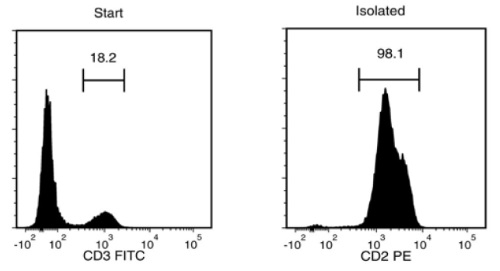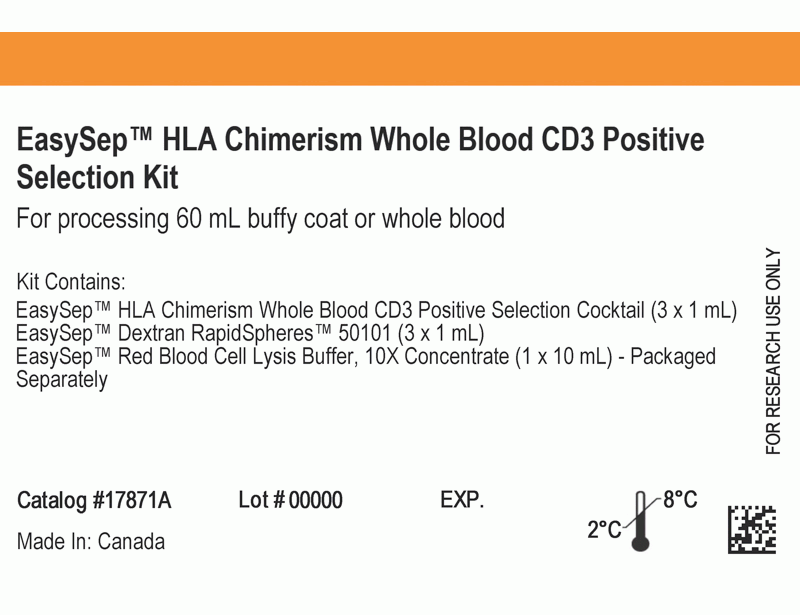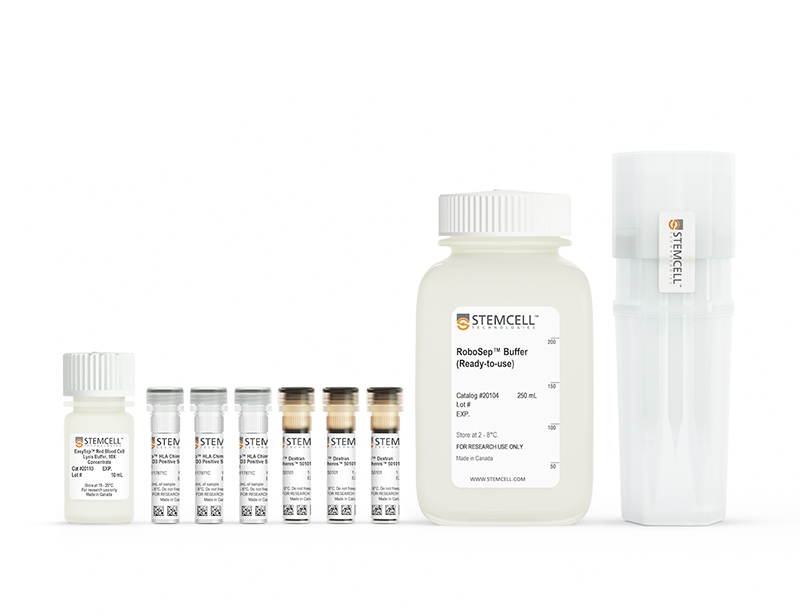EasySep™ HLA Chimerism Whole Blood CD3 Positive Selection Kit
Immunomagnetic positive selection cell isolation kit
概要
The EasySep™ HLA Chimerism Whole Blood CD3 Positive Selection Kit is designed to isolate CD3+ cells from fresh whole blood or buffy coat by positive selection. Desired cells are targeted with Tetrameric Antibody Complexes recognizing CD3 and dextran-coated magnetic particles. The cocktail also contains an antibody to human Fc receptor to minimize nonspecific binding. Labeled cells are separated using an EasySep™ magnet without the use of columns. Cells of interest remain in the tube while unwanted cells are poured off. The CD3 antigen is expressed on T cells and NKT cells.
This product replaces the EasySep™ Human Whole Blood CD3 Positive Selection Kit (Catalog #18081) and EasySep™ HLA Whole Blood CD3 Positive Selection Kit (Catalog #18081HLA), for even faster cell isolations.
This product replaces the EasySep™ Human Whole Blood CD3 Positive Selection Kit (Catalog #18081) and EasySep™ HLA Whole Blood CD3 Positive Selection Kit (Catalog #18081HLA), for even faster cell isolations.
Advantages
• Fast and easy-to-use
• Up to 99% purity
• No columns required
• Compatible across EasySep™ "The Big Easy", EasyEights™, and RoboSep™-S platforms
• Up to 99% purity
• No columns required
• Compatible across EasySep™ "The Big Easy", EasyEights™, and RoboSep™-S platforms
Components
- EasySep™ HLA Chimerism Whole Blood CD3 Positive Selection Kit (Catalog #17871)
- EasySep™ HLA Chimerism Whole Blood CD3 Positive Selection Cocktail, 3 x 1 mL
- EasySep™ Dextran RapidSpheres™ 50101, 3 x 1 mL
- EasySep™ RBC Lysis Buffer 10X Concentrate, 10 mL (Catalog #20110)
- RoboSep™ HLA Chimerism Whole Blood CD3 Positive Selection Kit with Filter Tips (Catalog #17871RF)
- EasySep™ HLA Chimerism Whole Blood CD3 Positive Selection Cocktail, 3 x 1 mL
- EasySep™ Dextran RapidSpheres™ 50101, 3 x 1 mL
- EasySep™ RBC Lysis Buffer 10X Concentrate, 10 mL (Catalog #20110)
- RoboSep™ Buffer (Catalog #20104) x 2
RoboSep™ Filter Tips (Catalog #20125) x 2
Magnet Compatibility
• “The Big Easy” EasySep™ Magnet (Catalog #18001)
• EasyEights™ EasySep™ Magnet (Catalog #18103)
• RoboSep™-S (Catalog #21000)
Subtype
Cell Isolation Kits
Cell Type
T Cells
Species
Human
Sample Source
Buffy Coat, Whole Blood
Selection Method
Positive
Brand
EasySep
Area of Interest
HLA, Immunology
技术资料
| Document Type | 产品名称 | Catalog # | Lot # | 语言 |
|---|---|---|---|---|
| Product Information Sheet | EasySep™ HLA Chimerism Whole Blood CD3 Positive Selection Kit | 17871 | All | English |
| Product Information Sheet | RoboSep™ HLA Chimerism Whole Blood CD3 Positive Selection Kit | 17871RF | All | English |
| Safety Data Sheet 1 | EasySep™ HLA Chimerism Whole Blood CD3 Positive Selection Kit | 17871 | All | English |
| Safety Data Sheet 2 | EasySep™ HLA Chimerism Whole Blood CD3 Positive Selection Kit | 17871 | All | English |
| Safety Data Sheet 1 | RoboSep™ HLA Chimerism Whole Blood CD3 Positive Selection Kit | 17871RF | All | English |
| Safety Data Sheet 2 | RoboSep™ HLA Chimerism Whole Blood CD3 Positive Selection Kit | 17871RF | All | English |
| Safety Data Sheet 3 | RoboSep™ HLA Chimerism Whole Blood CD3 Positive Selection Kit | 17871RF | All | English |
数据及文献
Data

Starting with human whole blood, the CD3+ cell content of the isolated fraction typically ranges from 92.4 - 99.8% (as assessed by staining the start and isolated fractions with anti-CD3 or anti-CD2 antibodies, respectively). In the above example, the purities of the start and the final isolated fractions are 18.2% and 98.1%, respectively (gated on CD45).
NOTE: Red blood cells were removed from the start sample by lysis prior to flow cytometry.
Publications (1)
Journal of immunology (Baltimore, Md. : 1950) 2018 NOV
Neutrophil and Granulocytic Myeloid-Derived Suppressor Cell-Mediated T Cell Suppression Significantly Contributes to Immune Dysregulation in Common Variable Immunodeficiency Disorders.
Abstract
Abstract
Common variable immunodeficiency disorders (CVID) represent a group of primary immunodeficiency diseases characterized by hypogammaglobulinemia and impaired specific Ab response, resulting in recurrent infections due to dysfunctional immune response. The specific mechanisms mediating immune deficiency in CVID remain to be determined. Previous studies indicated that immune dysregulation in CVID patients is associated with chronic microbial translocation, systemic immune activation, and altered homeostasis of lymphocytic and myeloid lineages. A detailed phenotypic, functional characterization of plasma markers and immune cell populations was performed in 46 CVID patients and 44 healthy donors. CVID patients displayed significantly elevated plasma levels of a marker of neutrophil activation neutrophil gelatinase-associated lipocalin. Neutrophils from CVID patients exhibited elevated surface levels of CD11b and PD-L1 and decreased levels of CD62L, CD16, and CD80, consistent with a phenotype of activated neutrophils with suppressive properties. Neutrophils from CVID patients actively suppressed T cell activation and release of IFN-$\gamma$ via the production of reactive oxygen species. Furthermore, CVID was associated with an increased frequency of low-density neutrophils (LDNs)/granulocytic myeloid-derived suppressor cells. LDN/granulocytic myeloid-derived suppressor cell frequency in CVID patients correlated with reduced T cell responsiveness. Exogenous stimulation of whole blood with bacterial LPS emulated some but not all of the phenotypic changes observed on neutrophils from CVID patients and induced neutrophil population with LDN phenotype. The presented data demonstrate that neutrophils in the blood of CVID patients acquire an activated phenotype and exert potent T cell suppressive activity. Specific targeting of myeloid cell-derived suppressor activity represents a novel potential therapeutic strategy for CVID.



